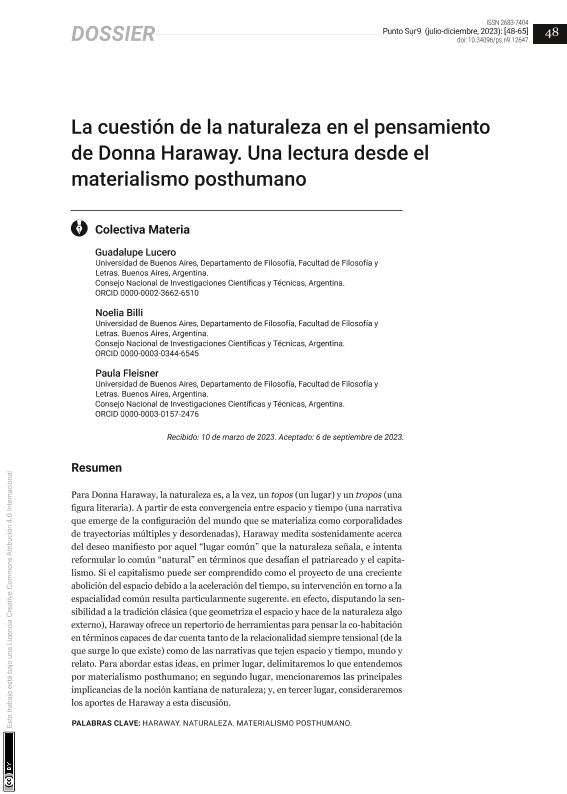Mostrar el registro sencillo del ítem
dc.contributor.author
Billi, Noelia

dc.contributor.author
Fleisner, Paula

dc.contributor.author
Lucero, Guadalupe

dc.date.available
2023-12-20T16:07:51Z
dc.date.issued
2023-11
dc.identifier.citation
Billi, Noelia; Fleisner, Paula; Lucero, Guadalupe; La cuestión de la naturaleza en el pensamiento de Donna Haraway: Una lectura desde el materialismo posthumano; Universidad de Buenos Aires. Facultad de Filosofía y Letras. Instituto de Geografía "Romualdo Ardissone"; Punto sur; 9; 11-2023; 48-65
dc.identifier.issn
2683-7404
dc.identifier.uri
http://hdl.handle.net/11336/220987
dc.description.abstract
Para Donna Haraway, la naturaleza es, a la vez, un topos (un lugar) y un tropos (una figura literaria). A partir de esta convergencia entre espacio y tiempo (una narrativa que emerge de la configuración del mundo que se materializa como corporalidades de trayectorias múltiples y desordenadas), Haraway medita sostenidamente acerca del deseo manifiesto por aquel “lugar común” que la naturaleza señala, e intenta reformular lo común “natural” en términos que desafían el patriarcado y el capita-lismo. Si el capitalismo puede ser comprendido como el proyecto de una creciente abolición del espacio debido a la aceleración del tiempo, su intervención en torno a la espacialidad común resulta particularmente sugerente. en efecto, disputando la sen-sibilidad a la tradición clásica (que geometriza el espacio y hace de la naturaleza algo externo), Haraway ofrece un repertorio de herramientas para pensar la co-habitación en términos capaces de dar cuenta tanto de la relacionalidad siempre tensional (de la que surge lo que existe) como de las narrativas que tejen espacio y tiempo, mundo y relato. Para abordar estas ideas, en primer lugar, delimitaremos lo que entendemos por materialismo posthumano; en segundo lugar, mencionaremos las principales implicancias de la noción kantiana de naturaleza; y, en tercer lugar, consideraremos los aportes de Haraway a esta discusión.
dc.description.abstract
Nature is, for Donna Haraway, both a topos (a place) and a trope (a literary figure). It is from this convergence of space and time (a narrative emerging from the configuration of the world that materialises as corporealities of multiple and messy trajectories) that Haraway engages in a meditation on the manifest desire for that ‘commonplace’ that nature points to, and attempts to reframe the ‘natural’ commonplace in terms that challenge patriarchy and capitalism. If capitalism can be understood as the project of an increasing abolition of space due to the acceleration of time, Haraway’s discussion of common spatiality is particularly suggestive. Indeed, contesting the sensibility of the classical tradition (which geometrises space and renders nature external), Haraway offers a repertoire of tools for thinking co-habitation in such terms as to account for both the always tensional relationality (from which what exists emerges) and the narratives that weave space and time, world and story. To address these ideas, firstly, we will delimit what we mean by posthuman materialism; secondly, we will mention the main implications of the kantian notion of nature; and thirdly, we will consider Haraway’s contributions to this discussion.
dc.format
application/pdf
dc.language.iso
spa
dc.publisher
Universidad de Buenos Aires. Facultad de Filosofía y Letras. Instituto de Geografía "Romualdo Ardissone"
dc.rights
info:eu-repo/semantics/openAccess
dc.rights.uri
https://creativecommons.org/licenses/by/2.5/ar/
dc.subject
HARAWAY
dc.subject
NATURALEZA
dc.subject
MATERIALISMO POSTHUMANO
dc.subject.classification
Otras Filosofía, Étnica y Religión

dc.subject.classification
Filosofía, Ética y Religión

dc.subject.classification
HUMANIDADES

dc.title
La cuestión de la naturaleza en el pensamiento de Donna Haraway: Una lectura desde el materialismo posthumano
dc.title
The question of nature in the thought of Donna Haraway: A reading from posthuman materialism
dc.type
info:eu-repo/semantics/article
dc.type
info:ar-repo/semantics/artículo
dc.type
info:eu-repo/semantics/publishedVersion
dc.date.updated
2023-12-19T23:17:40Z
dc.journal.number
9
dc.journal.pagination
48-65
dc.journal.pais
Argentina

dc.description.fil
Fil: Billi, Noelia. Consejo Nacional de Investigaciones Científicas y Técnicas; Argentina. Universidad de Buenos Aires. Facultad de Filosofía y Letras. Departamento de Filosofía; Argentina
dc.description.fil
Fil: Fleisner, Paula. Universidad de Buenos Aires. Facultad de Filosofía y Letras. Departamento de Filosofía; Argentina. Consejo Nacional de Investigaciones Científicas y Técnicas; Argentina
dc.description.fil
Fil: Lucero, Guadalupe. Consejo Nacional de Investigaciones Científicas y Técnicas; Argentina. Universidad de Buenos Aires. Facultad de Filosofía y Letras. Departamento de Filosofía; Argentina
dc.journal.title
Punto sur
dc.relation.alternativeid
info:eu-repo/semantics/altIdentifier/url/http://revistascientificas.filo.uba.ar/index.php/RPS/article/view/12647
dc.relation.alternativeid
info:eu-repo/semantics/altIdentifier/doi/http://dx.doi.org/10.34096/ps.n9.12647
Archivos asociados
